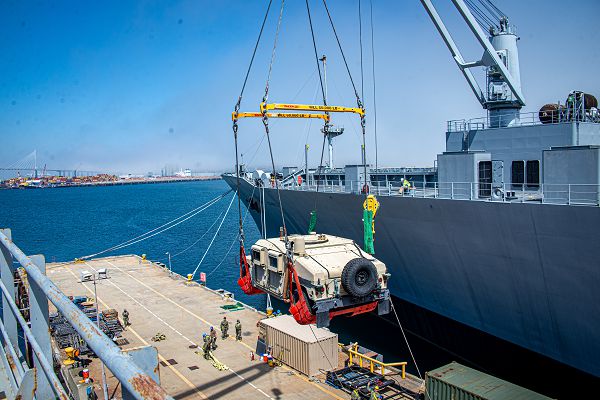
Long Beach, California. (April 10, 2023): In this photo by Chief Boatswain’s Mate Nelson Doromal Jr., Sailors assigned to Maritime Expeditionary Security Squadron 11 and Navy Cargo Handling Battalion 14 conduct a lift on/lift off operation aboard SS Cape Inscription, a commercial vessel that is part of the U.S. Naval Reserve fleet.
The Adaptive Force Exercise, held in Port of Long Beach, is part of a series of continuous training events for Navy Expeditionary Combat Forces. The series evaluates the Navy’s ability to deliver “expeditionary logistics,” the unique field of planning, staging, and delivering a diverse mix of cargo to combat situations around the world. This critical mission belongs to the Navy Expeditionary Logistics Support Group (NAVELSG) made up of more than 3,300 personnel assigned to three regiments and seven battalions located throughout the United States.
Headquartered in Williamsburg, Virginia, NAVELSG delivers worldwide expeditionary logistics using active and reserve personnel to do port and air cargo handling missions, distribute fuels, and manage freight terminal and warehouse operations. They also handle dangerous materials and even provide postal services. The NAVELSG team also responds to humanitarian crises and serves as America’s ambassador by creating allies through extending relief efforts to other nations.
Essential to any successful logistics effort is security of people and cargo, a responsibility that falls to Maritime Expeditionary Security Squadron 11. Their primary mission is force protection for deployed troops and physical security of harbors and waterways. The squadron specializes in counterterrorism, harbor and maritime infrastructure defense, and high value target protection. Specialized units deploy worldwide to detect, deter, and defend U.S. units around the globe. Recent assignments include Panama, Korea, Saudi Arabia, Kuwait, Iraq, Afghanistan, Bahrain, the United Arab Emirates, and Egypt.
The piece of the logistics puzzle is Cargo Handling Battalions. These specialized units trace their lineage to U.S. Navy's first "Combat Stevedores", a group of forty one "Special" Naval Construction Battalions created during World War II. Historically, a stevedore, also called a longshoreman or dockworker, is a term used to describe waterfront manual laborers who load and unload ships, trucks, trains or airplanes.
In the Navy, Cargo Handlers must know how to operate a variety of loading equipment, the proper techniques for lifting and stowing cargo, and the correct handling of hazardous materials. In addition, these Sailors must be physically strong and able to follow orders under stressful, often dangerous conditions. In wartime, these combat “stevedores” load and unload vital cargo, often under the threat of enemy fire.
Adaptive Force Exercises give Sailors like these the chance to practice delivering their precious cargoes to the troops that need them.


